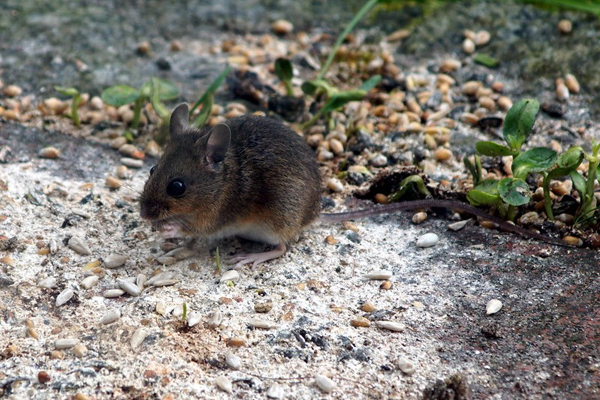Mice are small and furry rodents that look similar to rats but are smaller. They belong to the same family as rats and are known as Rattus norvegicus. Mice are fascinating creatures that can be found all over the world. They are known for their ability to breed quickly and for their tendency to spread disease.
The house mouse is one of the most common rodents in North America. This blog post will provide some interesting facts about our common house mice.
House Mice Facts
Mus musculus or house mice are small rodents that live inside and around homes. They are sometimes mistaken for the field mice, as they look quite similar. House mice are known to be quite a pest but are also interesting creatures to study. Here are some interesting facts about house mice:
They Can be Found Everywhere!
The house mouse originated from China, but can now be found all over the world, except in Antarctica. Commonly, house mice live in areas where people live and work more than those without human activity.
Mice Reproduce Very Quickly
Females give birth to litters of up to 12 babies every three weeks. They are able to reproduce from as young as two weeks old, which means they can have up to 150 baby mice per year. House mice have a polygynous mating system, which means that one male mates with multiple females. The dominant males usually have the most mates and are able to produce more offspring than other mice in their group.
House mouse breed year-round, female house mouse produces up to ten litter per year. The gestation period for mice is 19-21 days and a female can produce up to 12 pups per litter.
Young house mice are taken care of by the mother for up to four weeks, after which they are able to fend for themselves and leave their family group to find a mate and produce their own offspring.
House Mice Have Short Lifespans
The average lifespan of house mice is six months, but they can live up to two years under ideal conditions. Mice in the wild often do not live beyond the age of six months due to predators and other environmental factors.
They Like to Live in Dark Places
House mice prefer to live in dark, warm places. They can be found all over the world in houses and other buildings. They prefer to live near a food source, such as cultivated fields, farms, and in commercial buildings like warehouses.
House Mice are Omnivorous
House mice eat both plants and animals. They usually prefer foods such as seeds and grains but will also eat insects and other invertebrates if they’re available. Their diet is supplemented by scavenging around human homes for scraps of human food or anything left lying around that they can chew on.
They Have Huge Appetites
House mice eat up to 15 to 20 times per day. This is incredible considering the fact that they only weigh between one and two ounces as adults. Usually, mice eat small amounts of food, but they can eat a lot if there is enough food available.

They’re Nocturnal
Mice are active at night and will leave in search of food during the day. They are very cautious and will only approach something if they are sure it is safe.
They’re Very Social
House mice are social animals that live in groups, but the size of the group can vary depending on the availability of food and shelter.
Mice Don’t Hibernate
While some rodents hibernate during the winter, mice do not. They are active year-round and can survive cold temperatures by burrowing into the ground or finding warm places inside buildings.
House Mice are Very Territorial
House mice are considered territorial animals when they are living with other house mice and they will mark their territory by leaving urine and feces. They also use scent to communicate with other members of their group, including when they are warning others about a predator or inviting others to mate.
They’re Quite Agile
Mice are very curious creatures and will explore their surroundings. House mice are known to be very active; they can jump up to three feet high and scurry around at speeds of up to six miles per hour. They are also good at climbing, running on wires and pipes to get around quickly inside a building.
House Mice Have Weak Vision
A house mouse’s eyesight is not very good and they rely mostly on their sense of smell and touch to navigate their surroundings. They have a very good sense of smell, taste, and hearing. They use their whiskers to feel their way around and identify objects and obstacles.
They Make a Lot of Noise
Mice communicate with each other through a variety of noises, including squeaks, chatters, and growls. The noises that they make can vary depending on the situation. For example, a high-pitched squeak may be used to warn other mice of a predator or when they are in danger, while a low chatter is usually used during social interactions like mating.
They Have Many Different Ways to Communicate
They communicate using sounds, scent-marking (urine), body language, touch, taste, and smell. They are able to perceive the world through sight, smell (which is their most important sense), hearing, or touch. They use sound as a way of communicating with other members of their group, but they also emit high-pitched squeaks when they are in danger, or showing aggression. When a mouse is happy, it will make a low-pitched purring noise.
In a study, it is discovered that when female mice produce pheromones, males produce ultrasonic vocalization in response, and females are attracted to the call of males. Also, mice can recognize their own species by smell alone.

House Mice are Prey to Other Animals
House mice are preyed upon by cats, birds of prey, foxes, and snakes. House mice will try to avoid predators if given a chance – they run away from danger instead of fighting back when being attacked because they have no natural defense against most predators. If they are cornered, however, they may try to fight back or use their sharp teeth and claws to defend themselves.
House Mice are Vectors of Diseases
Mice can carry diseases that can be passed on to humans, including salmonella, leptospirosis, and hantavirus. They also spread other diseases through their feces and urine, which can contaminate food sources such as grain or pet food. Mouse urine has a strong smell that can be detected by humans and other wildlife, which makes it easy for them to find their way into homes. Mouse droppings are also visible and can be found on surfaces such as countertops or floors.

House Mice Love Human Company
Mice like to be around humans and will live in close proximity to them if possible. They usually enter a building through small openings, such as cracks in the walls or around doors and windows. Once they are inside, they can quickly spread throughout the structure by running along wires and pipes.
House Mice Control
House mice are considered pests because they can damage property and spread diseases. They can contaminate food with their urine and feces, which can cause illnesses.
House mice control starts in the home and backyard. Seal up any openings that may allow the mice to get inside. Keep food in rodent-proof containers and dispose of garbage properly. They can also be controlled through baiting, trapping, and the use of mouse repellents and poisonous bait for effective results. The most common method used is snap traps because they are easy to set up and effective in killing the mice.
Hiring a professional wildlife pest control company is necessary if the infestation is too large or hard to manage alone. It may also be worth it for peace of mind when dealing with rodents as they can cause significant damage and health risks to humans.
House Mice Prevention Tips
- In order to stop mice from entering your home or building, seal up any holes or cracks in the walls and around doors and windows with steel wool; make sure there are no gaps larger than one-quarter inch wide.
- Store food in airtight containers and clean up any spilled food immediately; do not leave pet food out overnight.
- Remove clutter from your home or yard as it provides hiding places for mice.
- Keep trees and shrubs trimmed away from the building as they can provide a path into the structure.
- Use a mousetrap to kill any mice that are already in the home.
- Immediately call a professional pest control company if you are having an infestation problem with mice.
Need Help With a Mouse Infestation?
If you are dealing with a house mouse infestation in your home or business, call a professional pest control company like AAAC Wildlife Removal for assistance. We have over 15 years of experience removing wildlife and pests such as rats, squirrels, raccoons, and more.
Our team of rodent removal experts will use humane methods to safely remove the mice from your property. We have the tools and expertise to get the job done right, so you can rest assured that your home will be rodent-free in no time.
If you hear the sound of mice in your attic or property and are causing a disturbance, don’t panic! Call us and we can help you solve your problem.
Many don’t know the difference between a rat and a mouse. but it doesn’t matter, we’ll remove them all the same.
Originally published on https://aaacwildliferemoval.com/blog/mice/house-mice-facts














